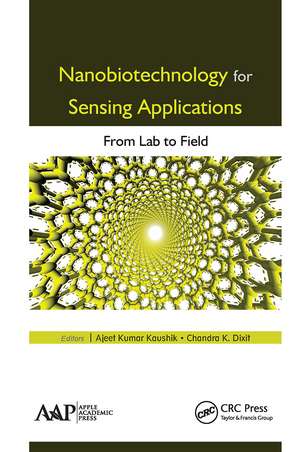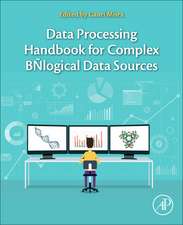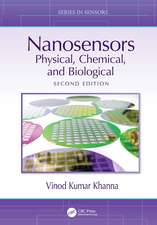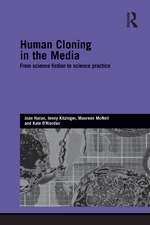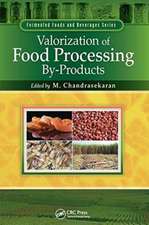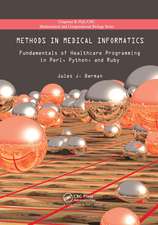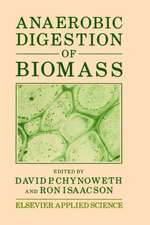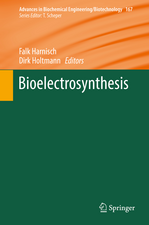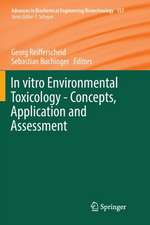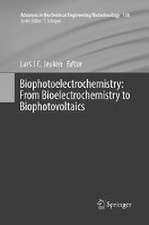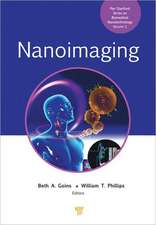Nanobiotechnology for Sensing Applications: From Lab to Field
Editat de Ajeet Kumar Kaushik, Chandra K. Dixiten Limba Engleză Paperback – 31 mar 2021
Preț: 579.62 lei
Preț vechi: 681.91 lei
-15% Nou
Puncte Express: 869
Preț estimativ în valută:
110.91€ • 115.80$ • 91.79£
110.91€ • 115.80$ • 91.79£
Carte tipărită la comandă
Livrare economică 05-19 aprilie
Preluare comenzi: 021 569.72.76
Specificații
ISBN-13: 9781774636060
ISBN-10: 1774636069
Pagini: 386
Ilustrații: 104
Dimensiuni: 156 x 234 x 20 mm
Greutate: 0.45 kg
Ediția:1
Editura: Apple Academic Press Inc.
Colecția Apple Academic Press
ISBN-10: 1774636069
Pagini: 386
Ilustrații: 104
Dimensiuni: 156 x 234 x 20 mm
Greutate: 0.45 kg
Ediția:1
Editura: Apple Academic Press Inc.
Colecția Apple Academic Press
Public țintă
Academic and PostgraduateCuprins
Preface. Nanobiotechnology: An Abrupt Merger. Nanosurface Preparation and Biofunctionalization: Types and Methods. Antibody Immobilization Chemistries for Nanosurfaces. Advances in Thin Film and 2-D Biosensors. Integrated Electronics, Analytical Transducers and Signal Processing. Nanobiotechnology for Enzymatic Sensors. Nanobiosensors for Genosensing. Nanomaterials-Based Immunosensors for Clinical Diagnostics Applications. Nanotoxicity Assessment. Nanobiosensor Technology for Cardiovascular Diseases. Nano-Biosensing Platforms for In vivo Applications. Wearable Nano-Enabled Biosensors. Challenges and Future Prospects of Nano-enabling Sensing Technology. Index.
Notă biografică
Ajeet Kumar Kaushik, PhD, is a faculty member at the Centre of Personalized Nanomedicine, Department of Immunology of Florida International University (FIU), Miami, Florida, USA. He is exploring smart electro-active magnetic nanocarriers for on-demand site-specific delivery and controlled release of therapeutics across BBB to prevent HIV, a new approach to neuroAIDS. He has worked as a postdoctoral research associate in the area of fabrication of BioMEMS-based electrochemical biosensors for biomarker detection using nanostructures at the Department of Electrical and Computer Engineering of FIU. He has also worked at Chungnam National University, Deajeon, Korea, as a Visiting Researcher and at Dublin City University, Dublin, Ireland, as a research assistant. He has published over 70+ international research papers jointly in the area of nanostructured platforms for biosensor and drug delivery applications. His main research interest is the fabrication of nanomedicine and wearable sensors for personalized health care. Dr. Kaushik received his PhD (chemistry and biosensors) in collaboration with the National Physical Laboratory and Jamia Milia Islamia, New Delhi, India.
Chandra K. Dixit, PhD, is working as a postdoctoral associate in the area of disease diagnostics, microfluidics systems for POC, nanoimprinted polymers, and electrochemical biosensors at the Department of Chemistry at the University of Connecticut. He has acquired significant experience in biosensors, microfluidics, and disease diagnostics from his previous postdoctoral research. His future research focus is in the field of developing cheap diagnostics for field applications. He has published over 20 international research papers in the area of biosensors, microfluidics, and disease diagnostics. Dr. Dixit received his Masters degree from CCS University, in Meerut, India, and his PhD in Biotechnology from Dublin City University, Dublin, Ireland, where he worked with Professors Richard O’Kennedy, Colette McDonagh, and Brian MacCraith as his PhD supervisors.
Chandra K. Dixit, PhD, is working as a postdoctoral associate in the area of disease diagnostics, microfluidics systems for POC, nanoimprinted polymers, and electrochemical biosensors at the Department of Chemistry at the University of Connecticut. He has acquired significant experience in biosensors, microfluidics, and disease diagnostics from his previous postdoctoral research. His future research focus is in the field of developing cheap diagnostics for field applications. He has published over 20 international research papers in the area of biosensors, microfluidics, and disease diagnostics. Dr. Dixit received his Masters degree from CCS University, in Meerut, India, and his PhD in Biotechnology from Dublin City University, Dublin, Ireland, where he worked with Professors Richard O’Kennedy, Colette McDonagh, and Brian MacCraith as his PhD supervisors.
Recenzii
"The editors (Ajeet Kaushik and Chandra Dixit) have a made good effort toward the collection of articles on different topics relating to applications of nanotechnology to biosensing . . . . The emphasis is on taking nanobiotechnology from laboratory to field. On the whole the book is a good reading and will inspire those who are currently working on technological applications of nanobiosensors."
—Bansi D. Malhotra, Professor, Department of Biotechnology, Delhi Technological University, India
"This book, edited by Dr. Kaushik and Dr. Dixit, highlights the journey of biosensors from fundamentals to applied research. The advancements in nano-enabled sensing components aiming to integrate miniaturized sensing systems for health purposes are very nicely explained here. Further, in an effort to promote personalized health care, the book looks at the need for developing point-of-care sensing (POC) systems, which is well described. This book would be perfect platform for readers of every level to understand biosensors, to design of future research, and to explore strategies for POC sensing for personalized health monitoring needed for better life styles."
—Sunil K Arya, Marie Curie Fellow, Department of Electronic & Electrical Engineering, University of Bath, England
"Achieves AN IMPRESSIVE OVERVIEW OF THE FIELD of nanotechnology based biosensors. It explores the design and development of various styles of sensors, and their in-vitro and in-vivo appli-cations. This book is suitable for multi-disciplinary researchers and students to get a complete back-ground and broad knowledge of nanotechnology based biosensors. . . . [Provides] a comprehensive and appropriate description of nanobiosensors and their use in developing point-of-care systems, ranging from nanosurface preparation and biofunctionalisation to nanobiosensor fabrication, covering the transition from in-vitro to in-vivo applications. Each chapter is a good combination of theory and application, including typically informative figures and examples to aid understanding."
—Biosensors and Bioelectronics, Review by Lingyin Meng, Biosensors and Bioelectronics Centre, Department of Physics, Chemistry and Biology, Linköping University, Sweden
—Bansi D. Malhotra, Professor, Department of Biotechnology, Delhi Technological University, India
"This book, edited by Dr. Kaushik and Dr. Dixit, highlights the journey of biosensors from fundamentals to applied research. The advancements in nano-enabled sensing components aiming to integrate miniaturized sensing systems for health purposes are very nicely explained here. Further, in an effort to promote personalized health care, the book looks at the need for developing point-of-care sensing (POC) systems, which is well described. This book would be perfect platform for readers of every level to understand biosensors, to design of future research, and to explore strategies for POC sensing for personalized health monitoring needed for better life styles."
—Sunil K Arya, Marie Curie Fellow, Department of Electronic & Electrical Engineering, University of Bath, England
"Achieves AN IMPRESSIVE OVERVIEW OF THE FIELD of nanotechnology based biosensors. It explores the design and development of various styles of sensors, and their in-vitro and in-vivo appli-cations. This book is suitable for multi-disciplinary researchers and students to get a complete back-ground and broad knowledge of nanotechnology based biosensors. . . . [Provides] a comprehensive and appropriate description of nanobiosensors and their use in developing point-of-care systems, ranging from nanosurface preparation and biofunctionalisation to nanobiosensor fabrication, covering the transition from in-vitro to in-vivo applications. Each chapter is a good combination of theory and application, including typically informative figures and examples to aid understanding."
—Biosensors and Bioelectronics, Review by Lingyin Meng, Biosensors and Bioelectronics Centre, Department of Physics, Chemistry and Biology, Linköping University, Sweden
Descriere
This book explores the potential of nanosystems as a multidisciplinary science with the aim of the design and development of smart sensing technologies using micro/nano electrodes and novel nanosensing material. It discusses their integration with MEMS, miniaturized transduction systems, novel sensing strategies, and wearable sensors performing
